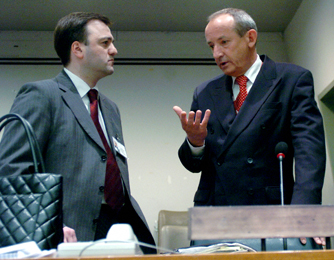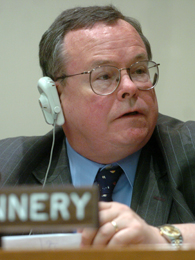|

 |
|
|
|
Fourteenth
Session of the Commission on Sustainable Development
(CSD-14)
1-12
May 2006 | United Nations Headquarters, New York
|
Highlights for Tuesday, 9 May 2006 |
|
|
|

|
|
| Thematic Discussion:
Enhancing the contributions of the private sector and other stakeholders |
| CSD Vice-Chair Javad Amin-Mansour, Iran, chaired the morning thematic discussions |
|
Linda J. Fisher, DuPont (left), noted three roles for multinational corporations (MNCs): a sustainable approach to the environment, by setting ambitious targets; bringing new and innovative solutions to the market and then applying them to supply chains; and working closely with multiple stakeholders in pursuit of social responsibility. She underlined the need for a clearly defined governance framework in developing countries, and the challenge of scaling up projects into sustainable business models. Noting the tendency of enterprises to shift responsibility onto workers and future generations, Bernard Saincy, Confédération Générale du Travail, France (center) , highlighted the need to make enterprises more transparent, reform voluntary frameworks, and utilize fundamental rights as a new tool for social dialogue. He called for discussion at CSD-15 on a regulatory framework for corporate social responsibility. Peter Odili, Rivers State, Nigeria (right), addressed the conditions required to attract energy investment, including a stable investor-friendly environment, and described the facilitating role required of governments. He discussed an independent power generation project in the Rivers State based on partnership, transparency and open competition. |
 |
|
| Noting two initiatives for the development and transfer of technologies, Brian Flannery, Exxon Mobil (left), stressed the critical role of partnerships in phasing out leaded gasoline around the world and developing new clean technologies. Karsani Aulia, Pertamina-Bumi Siak Pusako Energy, Indonesia (right), described a small national oil company's contribution to protecting the environment. Referring to extraction operations, he noted the protection of flora and fauna, a zero discharge water policy, and ISO14001 certification. |
| To maximize the private sector's role, Steve Lennon, Eskom (left), stressed the need to take full advantage of the dividends from infrastructure project development, align funding with development priorities, pursue efficient energy systems in developing countries, and engage in technological development through partnership. |
Noting the emphasis on market based technology-driven solutions at CSD-14, Workers and Trade Unions stressed that much technology transfer comes from government labs, and that decent jobs are fundamental to poverty reduction.
|
| Youth and Children called for government oversight to deal with environmental and social costs, and said the market and private sector would not achieve environmental justice and sustainability on their own. |
| Distribution of the Chair's draft summary |
| Delegates review the text prior to the convening of the afternoon Plenary session |
| Delegates comment on the Chair's draft summary |
| CSD Chair Aleksi Aleksishvili invited delegates to comment on his draft summary. He opened the meeting with words of thanks to the Vice-Chairs and the participating delegations for contributing to dynamic and rich discussions. He noted that the first part of his summary captures key points that emerged in discussions during the official sessions of CSD-14. |
| South Africa, speaking for the G-77/China, supported by several countries, stressed the need for means of implementation, such as the effectiveness of ODA, technology transfer, financing, and market access, to be properly reflected. |
| Barbados, on behalf of AOSIS, stressed that climate change adaptation is not substitution for mitigation and that they must be pursued together under UNFCCC. He noted that greater emphasis is needed to support adaptation to climate change in SIDS and the need for stronger language on climate change and natural disasters. Gary Pringle, Canada, suggested including a chapeau to clarify that the document is based on country and Major Group interventions. |
| Khaled Elbakly, Egypt, said the text focused mostly on mitigation of climate change while adaptation is a priority for developing countries. |
| Closing Session of the Partnerships Fair and "Partnerships in Practice" interactive discussion on Working in Collaboration: Partnership Networking and Relationship Building |
|
|
|
|
|
|
|
|
| |
|
 Please
e-mail the
Digital Editor if
you have any questions regarding the content of this
page. Please
e-mail the
Digital Editor if
you have any questions regarding the content of this
page.
| Back to
Linkages home | Visit
IISDnet | Send e-mail to
ENB |
© 2006, IISD. All rights reserved. |
|
|
|